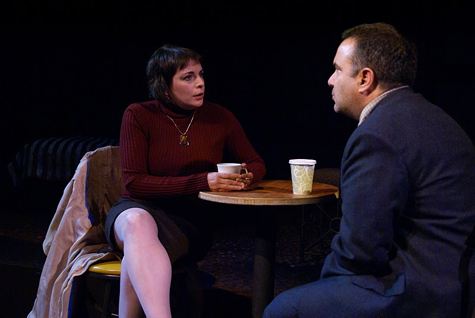
SETUP Love is in the care. |
Three months after her father's death, the two people closest to thirty-something Suzanna (Elizabeth Chambers) don't have a lot of patience for her grief, which has her reduced to a weeping mess watching bad TV under a blanket. Her laconic sort-of brother Max (Brent Askari) berates her to "be a big girl," threatening, "No more dead prostitutes on the Autopsy channel until you do it." And: "Some women are sensual in grief," observes her mother Susan (Tootie Van Reenen), of old Southern gentility. "You are not." There is love in this room, but love and kindness are as flawed as any vice in Gina Gionfriddo's biting comedy Becky Shaw, on stage in a viciously funny production by Mad Horse Theatre Company, directed by James Herrera at Lucid Stage.
There's no shortage of dysfunction among Suzanna's family members: Max, a financial analyst, is a crass bully incapable of empathy; he and Suzanna insult each other with an ardor that betrays something deeper than sibling love; and the callous woman who raised them, in denial about the family's financial crisis, has taken up with (to use Suzanna's term) a thirty-something "rent boy." Distraught and lacking in solace from her family, Suzanna impulsively marries a sweet young writer, feminist, and barista named Andrew (Burke Brimmer) who is, unlike the rest of them, so empathetic that he cries while he watches porn. The latent tensions in and around this match are made manifest when Suzanna and Andrew set Max up with the mousy, nervous, damaged title character, Becky Shaw (Janice Gardner). In the fallout, we confront the faults — and the needs — behind each character's desires.
Andrew, for example, turns out to have a thing about saving women, and Brimmer, with his black-rimmed glasses, his measured gentleness, and his careful I'm-not-judging-you tone, subtly conveys the liberal righteousness that often seems like its own end. His Andrew is a perfect foil to the caustic theatrics of Askari, whose Max simply drips with sarcastic, outraged condescension. Brimmer also plays earnestly against Gardner's taut, twitchy Becky, who sometimes feels a little overwrought, but under Andrew's influence convincingly softens — and soon regains a dark strength of her own.
As the acerbic, derisive sort-of son and daughter of Van Reenen's nicely wry Susan, Askari and Chambers are delicious: Each has a sharp-edged intellect on stage that gives every barb extra bite. They also beautifully show the complex rapport and understanding between their characters as the strongest, most visceral, and thus most confounding affection on stage. Chambers is excellent conveying Suzanna's increasingly desperate confusion over Max's character, balancing her snark with earnestness and what she instinctively wants with what she thinks she should want: she wishes, Suzanna rails at Max, that she cried while she watches porn, and feels guilty that she doesn't.
This is one of the play's main threads, the bundled questions of what is love, what is goodness, and why is it that so often, what we love most viscerally is not what's good. Becky Shaw also explores, variously, loss, self-knowledge, buying and saving people, the motivations for kindness, and how much we can and should know about the people we love. "Your generation is fixated on intimacy," Susan tells her daughter, in one of the show's more provocative observations. "That's why your marriages don't last." All of this is a lot to bite off, thematically speaking, and Gionfriddo's script, for all its insights, at times feels a little rangy, unwilling to alight for too long on any one of its many bracing propositions.